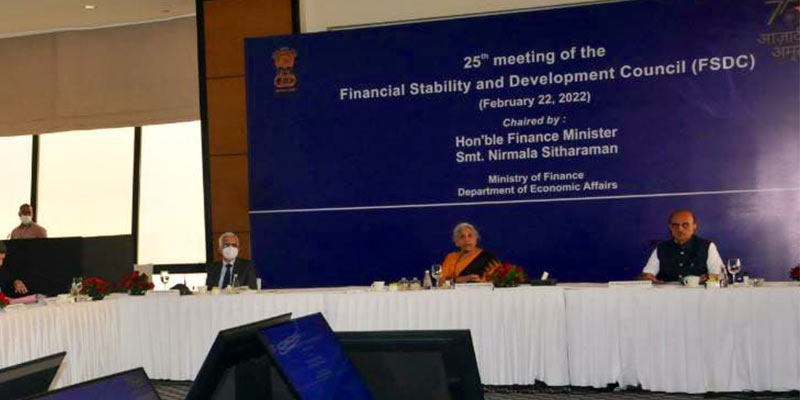- India
- Feb 23
Explainer / Financial Stability and Development Council
Finance Minister Nirmala Sitharaman chaired the 25th meeting of the Financial Stability and Development Council (FSDC).
This was the first meeting of the high-level panel after the presentation of Budget 2022-23. The previous meeting was held on September 3 last year.
The Financial Stability and Development Council (FSDC) meeting comes against the backdrop of rising tension between Russia and the US over Ukraine.
Highlights of the meeting:
• The FSDC noted that the government and all regulators need to maintain constant vigil on the financial conditions and functioning of important financial institutions, especially considering that it could expose financial vulnerabilities in the medium and long-term.
• The Council discussed measures required for further development of the financial sector and to achieve an inclusive economic growth with macroeconomic stability.
• The Council deliberated on the various mandates of the FSDC and major macro-financial challenges arising in view of global and domestic developments.
• The 25th FSDC meeting discussed operational issues relating to currency management and also took note of the activities undertaken by the FSDC Sub-Committee chaired by the RBI governor and the action taken by members on the past decisions of FSDC.
Financial Stability and Development Council (FSDC)
• The Financial Stability and Development Council (FSDC) was set up by the government as the apex level forum in December 2010 with a view to strengthening and institutionalising the mechanism for maintaining financial stability, enhancing inter-regulatory coordination and promoting financial sector development.
• Union Finance Minister is the chairperson of the Council.
• Members include Minister of State for Finance, the heads of the financial sector regulators (RBI, SEBI, PFRDA, IRDA & Forward Markets Commission) and secretaries of the relevant ministries/departments of the government.
• The Council can invite experts to its meeting if required.
• The Financial Stability and Cyber Security (FS&CS) Division in the Department of Economic Affairs provides secretarial assistance to the FSDC.
Functions of FSDC:
• Without prejudice to the autonomy of regulators, the Council monitors macro prudential supervision of the economy, including functioning of large financial conglomerates, and addresses inter-regulatory coordination and financial sector development issues.
• It also focuses on financial literacy and financial inclusion.
• The Council deliberates on contextual issues covering financial stability, financial sector development.
• It coordinates India’s international interfaces with financial sector bodies like the Financial Action Task Force (FATF) and the Financial Stability Board (FSB).
FSDC Sub-Committee (FSDC-SC)
• The FSDC is supported by a Sub-Committee (FSDC-SC), chaired by the RBI governor.
• Excluding the Chair of the FSDC and the MoS (Finance), all members of the FSDC are also the members of the Sub-Committee.
• Additionally, all four deputy governors (DG) of RBI, and secretary (FSDC), are also the members of the sub-committee.
• Financial Stability Report (FSR) acts as a communication tool of the central bank in limiting instability by pointing out the key risks and vulnerabilities, which may have systemic impact, to policy makers, market participants and the public at large.
• It reflects the collective assessment of the Sub-Committee of the Financial Stability and Development Council (FSDC-SC) on risks to financial stability and the resilience of the financial system in the context of contemporaneous issues relating to development and regulation of the financial sector.
Various working groups/technical groups
There are various working groups/technical groups constituted under the aegis of the FSDC.
1) The Inter-Regulatory Technical Group was set up in September 2011 for the purpose of inter-regulatory coordination among the financial sector regulators. The Group generally meets once in every two to three months and discusses issues relating to risks to systemic financial stability and inter-regulatory coordination and provides inputs to the sub-committee.
2) The Technical Group on Financial Inclusion and Financial Literacy was set up in November 2011. The Group is chaired by RBI deputy governor who is in charge of financial stability and has representatives from all regulators.
3) Inter Regulatory Forum for monitoring Financial Conglomerates (IRF-FC), modelled around the ‘lead regulator’ principle, was set up in August 2012. The IRF-FC is headed by RBI deputy governor (in-charge-of the Department of Banking Supervision) and represented by senior representatives of all the financial sector regulators at the level of executive directors.
4) The Early Warning Group was set up by the FSDC Sub-Committee in June 2012. The Group is chaired by RBI deputy governor who is in charge of Financial Markets Department.
5) The Macro Financial Monitoring Group was set up in May 2012, which meets regularly in DEA, to discuss any specific emergent issues. This Group is chaired by Chief Economic Adviser and has representation from all the Departments of the Ministry of Finance.
Manorama Yearbook app is now available on Google Play Store and iOS App Store

